Published Jun 9, 2015
Kirk vs. Picard: An Enduring Debate
Kirk vs. Picard: An Enduring Debate
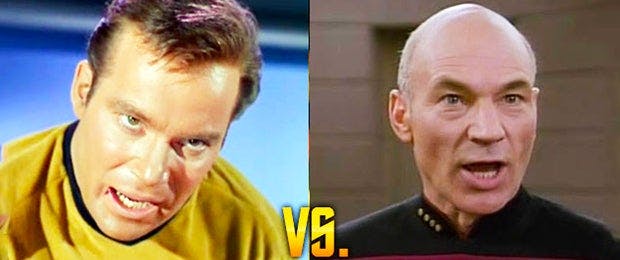
It’s a fannish heroic tradition dating back millennia.In Ancient Rome, I’d bet toga-clad citizen nerds played Fantasy Gladiator games, keeping score by scroll, drafting their favorite fighters from anywhere in the Empire and arranging imaginary arena matchups between gods and men: I. Greek-Roman Undercard. Heracles v. Hercules. II. Cyclops v. Oedipus. See It Now! III. Tag Team War. Jason v. the Argonauts. IV. Family Affair. Caesar v. Cleopatra. And V. Testament Classic. David v. Goliath. Skipping ahead several centuries, can’t you imagine such six-gun showdowns in the Wild West? Fanboys (of the cowboy kind), sipping sarsparilla and fingering dime novels, might likewise set heroes of that era against each other. Pat Garrett & Billy the Kid. Buffalo Bill Cody Presents Annie Oakley Jesse James Meets Frankenstein (they made a 1966 movie about it). Butch Cassidy & the Sundance Kid. Comic book geeks of the 1960s and ’70s, like me, repeatedly pondered such colorful combos of superheroes. Superman vs. Batman (film version coming up, always bet on bat)! Captain America vs. Nick Fury (with dynamic action in Strange Tales #159 illustrated by my future employer, comics artist Jim Steranko)! The Incredible Hulk vs. the Thing (i.e., the Fantastic Four’s orange rocky guy, not the Thing from Another World)! And, of course, Betty vs. Veronica!We science fiction buffs also belong to Fight Club: Flash Gordon vs. Buck Rogers (a busy day for Buster Crabbe), Kirk vs. Spock (see "Amok Time"), Luke vs. Han (with Leia cheering on both), Alien vs. Predator (no matter who wins, humanity loses). But, come 1987 and the premiere of Star Trek: The Next Generation, fannish thoughts turned to perhaps the greatest battle of them all: Kirk vs. Picard. And, you know, I already served as a color commentator on that thrilla from vanilla—in the pages of TV Guide.Begun in 1953, the weekly TV Guide grew up with television itself. For a long time, it vied with Reader’s Digest for the title of America’s topselling magazine. Sadly, TV Guide isn’t as relevant today (2015) as it once was. Over the last 25 years, the venerable magazine has endured ownership changes and format alterations, suffering steadily declining circulation (and revenues) as it floundered amid the devastation that killed so many publications (including mine). Most readers can now easily get informative listings on their own TV screens (as well as from the Internet and elsewhere). But, hey, in its day, TV Guide was one amazing magazine. Starting in the 1960s (at some point after I learned to read), I devoured TV Guide cover-to-cover weekly for decades. I ferreted out facts ("There’s going to be a Batman TV show!") and sampled groovy interviews (June Lockhart! She’s not only Lassie’s Mom but Lost in Space, too!). In those pre-VCR/DVD player days, TV Guide’s comprehensive program listings were the indispensable map to discovering when classic pictures like Forbidden Planet would air on local stations, which PBS affiliate was channeling Doctor Who and where in the world were those Twilight Zone reruns. TV Guide’s annual Fall Preview Issue (All the Details on New & Returning Shows!) was a particular favorite of mine.
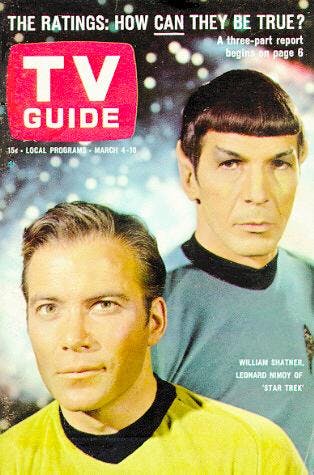
Back in summer 1991, freelancer Rick Marin rang me on TV Guide’s behalf. Interview please? Sure! So, he quizzed me (as Editor of Starlog and licensed Trek movie and Next Gen magazines) all about Captains James T. Kirk and Jean-Luc Picard. Like the others interrogated, I was considered both a Trek fan and a Trek expert. Marin and I talked for 15 minutes or so. Then, he asked me one fateful question — and I replied... well, I’ll tell you later. However, just as soon as I answered, I knew I had said too much, and, furthermore, realized that my latest hot quote was certainly destined to land a prominent place in the piece.You’ve probably had this experience yourself. In daily conversations, you may tell someone else (or hear from them) a pithy line of dialogue. Instantly, you recognize that this line is gonna cause grief, perhaps haunt you to the End of Days. Here are a few common examples: "Let’s just be friends." "We need it tomorrow." "I’d like to see other people." "Yes, you do look fat in that." As soon as you say (or hear) words like those, you might prefer having zipped your mouth and/or boxed your ears instead. Because "This means trouble!" Well, that’s how I felt about my answer.When I’ve been the guy doing the questioning, this species of sizzling statement has just leapt out of the ether and grabbed me during the interview. I immediately knew that this perfect quote from Stephen King, Denise Crosby or John Lasseter was THE ONE to begin or end my yet-to-be-written article. Those words had sent my "Spidey Sense" tingling. I’ve discussed this "lightning strikes with a quote" phenomena in shop talks with pals. Other writers have experienced it, too, but this is the first time I felt its power as an interviewee.Several weeks later, TV Guide (cover-dated August 31-September 5, 1991) hit newsstands just as Star Trek began celebrating its 25th Anniversary (having bowed September 8, 1966). Coverlines promised several appropriate features inside, but the cover itself was a painting by Kinuko Y. Craft depicting the two Captains. What had begun (I theorize) as an anniversary tie-in had apparently evolved into more of a "concept cover" with its own special "hook" to excite reader interest and prompt point-of-purchase sale. I can’t testify to any inside info as to how TV Guide crafted its 52 yearly covers (though I knew one of its movie critics, Maitland McDonagh). Nonetheless, having been part of devising almost 500 magazine covers myself (including Trek anniversaries), this interpretation seems plausible to me. In short, I believe TV Guide had only planned to celebrate Trek’s 25th, but the "Kirk vs. Picard" idea then proved "sexier," with real potential to actually increase per copy sales by intriguing (and maybe angering) fans. In this scenario, the anniversary was downplayed and the Clash of the Captains extravaganza upgraded from sidebar to cover story. Now the major coverline, this says it all, ballyhoos: "IT’S KIRK VS. PICARD Experts and fans debate who’s best."
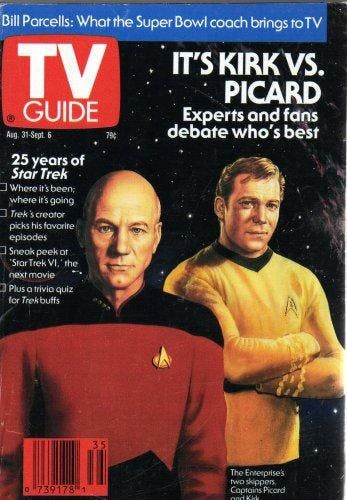
Inside this TV Guide, there’s a seven-page "package" of Trek features, one long article and five sidebars of varying sizes. The major piece quotes Gene Roddenberry, William Shatner, Leonard Nimoy, Nichelle Nichols, Rick Berman, Patrick Stewart, Michael Dorn, Whoopi Goldberg, Nicholas Meyer and studio exec John Pike, and also repeats fabled anecdotes about the saga and its significance. It’s by the prolific Michael Logan, a TV Guide veteran who authored many of the magazine’s Trek pieces over the years (especially on Next Gen, DS9 and Voyager). The sidebars include a four-paragraph preview of Star Trek VI: The Undiscovered Country (due out that December), a too-easy Trek trivia quiz, a photo gallery displaying a quartet of TOS guest stars and Roddenberry’s list of "My favorite voyages." You’ll want to know them. His choices (in alphabetical order): "Amok Time," "Balance of Terror," "The City on the Edge of Forever," "The Devil in the Dark," "The Enemy Within," "The Menagerie," "The Naked Time," "The Return of the Archons," "The Trouble with Tribbles" and "Where No Man Has Gone Before." Alas, there were no Roddenberry sound bites enumerating personal reasons for his selections. And no Next Gen picks."Kisses great!/Less killing! Comparing the captains: Kirk vs. Picard" is the headline of the main sidebar (technically, now the cover story), written by Rick Marin. Calmly, Marin elucidates the many differences between the two, his points buttressed by the talking heads on hand. The piece sorta urges those quoted to enlist with one of these Starfleet heroes. Team Kirk? Or Team Picard?Iconic SF writer Isaac Asimov didn’t choose sides, terming Kirk "more the classic hero," with Picard "reminiscent of Spock." Marking himself as a probable Picard partisan, TV critic David Bianculli (of the New York Daily News) lampooned Kirk skittering through the known (and unknown) universes "propelled by his libido." SF writer (and former Editor of Analog and Omni) Ben Bova must have been a Kirk man. He complained about all the talk on Next Gen, branding watching Picard as akin to "visiting a social worker." By the way, all three (Asimov, Bianculli, Bova) had contributed articles to Starlog.
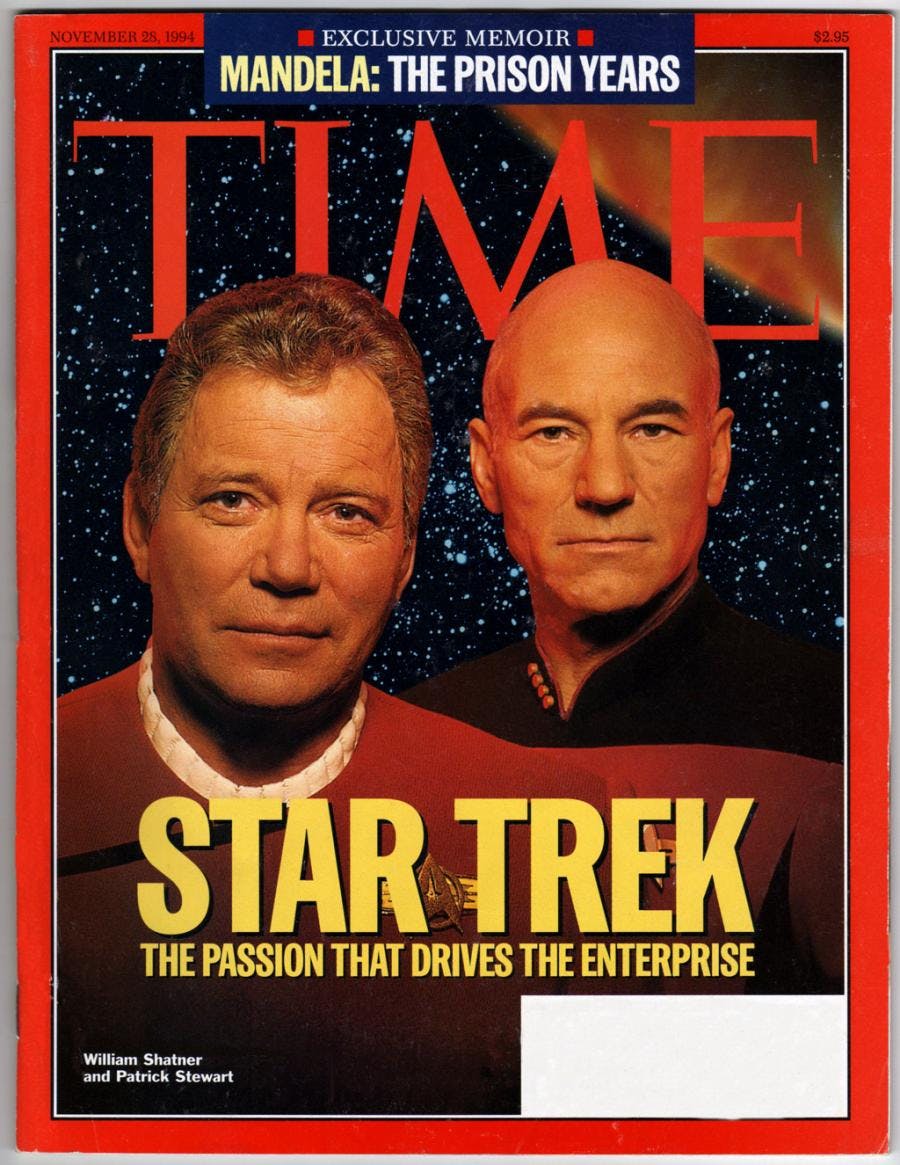
If NASA was recruiting for a new Space Shuttle commander, Marin explained, Picard would get the nod from Dr. Robert Jastrow, founder of NASA’s Goddard Institute for Space Studies. On the other hand, Apollo 11 astronaut Buzz Aldrin, a bit accustomed to space travel and walking on the Moon, thought both men worthy of Shuttle command: Kirk, the "explorer, shooting from the hip," Picard, "more like an ambassador to the stars."In my view, the major difference is that Kirk is a man of action, Picard is more a man of words. Picard would, in Marin’s description, "rather talk than fight." And then Marin brought me in to cap that argument. "Kirk’s first thought is to break out the phasers," I declared to millions of readers there in TV Guide. Them’s fightin’ words! Had I committed to Team Kirk? Team Picard was still whispering to the better angels of my nature.
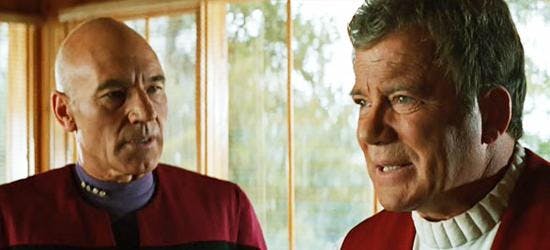
______David McDonnell, "the maitre’d of the science fiction universe," has dished up coverage of pop culture for more than three decades. Beginning his professional career in 1975 with the weekly "Media Report" news column in The Comic Buyers’ Guide, he joined Jim Steranko’s Mediascene Prevue in 1980. After 31 months as Starlog’s Managing Editor (beginning in October 1982), he became that pioneering SF magazine’s longtime Editor (1985-2009). He also served as Editor of its sister publications Comics Scene, Fangoria and Fantasy Worlds. At the same time, he edited numerous licensed movie one-shots (Star Trek and James Bond films, Aliens, Willow, etc.) and three ongoing official magazine series devoted to Trek TV sagas (The Next Generation, Deep Space Nine, Voyager). He apparently still holds this galaxy’s record for editing more magazine pieces about Star Trek in total than any other individual, human or alien.Copyright 2015 David McDonnell

